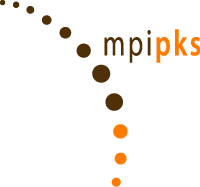
Ergodicity Breaking and Anomalous Transport in Quantum Many-Body Systems
Workshop Report
Report on International Workshop
“Ergodicity Breaking and Anomalous Transport in Quantum Many-Body Systems”
MPI for the Physics of Complex Systems, Dresden, 4-8 October 2021
The subject of the Workshop was the quantum dynamics of many-body systems. The particular focus was put on the physics of many-body localization (MBL) and generalized hydrodynamics (GHD). These two rapidly developing fields have multiple connections: they address non-equilibrium physics of many-body systems that either completely break ergodicity or show very slow thermalization, and also exhibit anomalous transport. Further, experimental platforms and computational approaches to both classes of systems have much in common. Presentation at the workshop have also covered related research directions, including, the physics of driven quantum systems as well of quantum measurements and the dynamics of quantum information.
The program included 35 invited talks, 11 contributed talks, and 33 posters. The total number of participants was 204, including 38 on-site and 166 virtual participants, representing 19 countries. In average, there was approximately 100 participants attending a scientific session, with peak values approaching 150. The program of the workshop included talks by a large number of leading experts in the field. At the same time, several invited talks, as well as the majority of contributed talks and of posters, were presented by young scientists who had an excellent opportunity to discuss their results with world-leading experts.
The Workshop involved a balance participation of experimentalists and theorists. While a larger fraction of the talks were theoretical, there was a considerable number of experimental talks that covered essentially all key platforms—cold atoms, quantum spin chains, trapped ions, superconducting qubit arrays, disordered semiconductors—where the physics discussed at the workshop is currently explored.
In our view, the Workshop was a highly successful event. It has offered a possibility of very fruitful discussions of the progress in the field and future perspectives. Each talk has been followed by a series of questions, answers, and comments. On many occasions, there were close connections between several talks that considered a related physics from somewhat different points of view, which has also promoted very instructive discussions. The meeting has stimulated various collaborations between the participants. We have received a feedback from many participants who pointed out that the workshop was very useful and stimulating.
The workshop was held in a hybrid format, which was an optimal solution in the present situation. In view of the COVID-related regulations, there was an upper limit 20 for the number of external on-site participants, implying a virtual format for the majority of participants. This was also inline with travel restrictions or complications for many participants, who would not be able to come to Dresden anyway. At the same time, it was extremely important to have a few tens of on-site participants, ranging from senior scientists to PhD students. This has permitted a very fruitful exchange of scientific ideas during numerous discussions between and after the scientific sessions.
We would like to thank the Institute staff, and in particular Mandy Lochar, for outstanding organizational support. The possibility to organize the Workshop in the hybrid format has greatly contributed to its success. We are very thankful to Ronny B ̈orner for invaluable support on the IT side.
Ferdinand Evers and Alexander Mirlin
